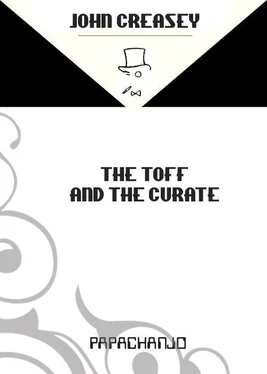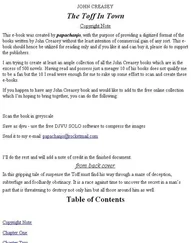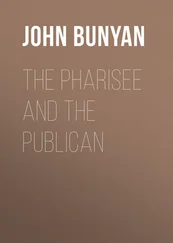John Creasey - The Toff And The Curate
Здесь есть возможность читать онлайн «John Creasey - The Toff And The Curate» весь текст электронной книги совершенно бесплатно (целиком полную версию без сокращений). В некоторых случаях можно слушать аудио, скачать через торрент в формате fb2 и присутствует краткое содержание. Жанр: Старинная литература, на русском языке. Описание произведения, (предисловие) а так же отзывы посетителей доступны на портале библиотеки ЛибКат.
- Название:The Toff And The Curate
- Автор:
- Жанр:
- Год:неизвестен
- ISBN:нет данных
- Рейтинг книги:5 / 5. Голосов: 1
-
Избранное:Добавить в избранное
- Отзывы:
-
Ваша оценка:
- 100
- 1
- 2
- 3
- 4
- 5
The Toff And The Curate: краткое содержание, описание и аннотация
Предлагаем к чтению аннотацию, описание, краткое содержание или предисловие (зависит от того, что написал сам автор книги «The Toff And The Curate»). Если вы не нашли необходимую информацию о книге — напишите в комментариях, мы постараемся отыскать её.
The Toff And The Curate — читать онлайн бесплатно полную книгу (весь текст) целиком
Ниже представлен текст книги, разбитый по страницам. Система сохранения места последней прочитанной страницы, позволяет с удобством читать онлайн бесплатно книгу «The Toff And The Curate», без необходимости каждый раз заново искать на чём Вы остановились. Поставьте закладку, и сможете в любой момент перейти на страницу, на которой закончили чтение.
Интервал:
Закладка:
Grice turned the car and drove to Craik’s shop. He and Rollison hurried into the shop, catching Craik by surprise as he stood behind the counter with a thin knife in his hand; it was poised over some tinned pork, for two waiting customers.
“Why, good afternoon!” said Craik, round-eyed. “I hope—”
“It’s no use, Keller,” said Rollison. “We know who you are.” He was almost taken by surprise by the other’s speed. Craik swung his right arm, slicing the air with the knife. Rollison backed swiftly, picked up a tin from the counter and flung it. The customers screamed. The tin caught Craik on the side of the head and made him stagger against the shelves. Rollison darted through the gap in the counter and to the stairs. By the time two of Chumley’s men were holding Craik and Grice was coming after Rollison, there were footsteps above their heads. Rollison put his shoulder to the door of the back bedroom and broke it down.
As he stood aside, a bullet came from the window.
“Look out!” he shouted.
He could not see into the room as he stood against the door, taking his automatic from his pocket. Then the door swung back a little and he saw two men by the window, one climbing out, and the other—Keller—standing still, his gun pointing towards the door.
Rollison fired through the crack.
The shot went wide but distracted Keller’s attention. Rollison pushed the door open wider and fired as the other tried to reach the window. Keller lost his grip on his gun and Grice leapt at him but by then Gregson was out of sight.
Rollison looked out of the window down into the narrow yard.
Gregson was standing in the middle of it, not certain what to do. Two plainclothes men were approaching rapidly. Gregson turned and made as if to enter the shop by the kitchen door but two more policemen entered the yard from there. Gregson looked right and left desperately but there was nothing he could do. Rollison called down to him.
“Make up your mind, Gregson!”
The vicious expression on Gregson’s face was made absurdly meaningless as the police closed on him from both sides.
Rollison turned back to the room.
Keller, who was not badly wounded, was glaring at him. His fine brown eyes were filled with malignance but he no longer looked impressive.
“Now all we need to know is why they were so anxious to frame Kemp,” Rollison said.
“Surely because he could lead to Straker,” Grice suggested. “Much more likely that Kemp actually knew something without realising its significance,” said Rollison.
He broke off outside the door of the bedroom where he had seen Craik apparently on the point of killing himself. On the bed were several books which looked like ordinary ledgers. He went closer. One was marked:
St Guy’s Poor People’s Relief Fund Another was marked: “ Church Reconstructio N”, a third: “ Church Accounts”.
“Now what have you found?” demanded Grice.
“The thing we wanted, I think,” said Rollison, opening one of the pages. “Yes—end of fiscal year for St Guy’s—July 31st. In about a week, the accounts would have had to be shown. Honorary Treasurer —Joseph Craik, Esq.” He turned over some of the pages, smiling oddly. “Many, many entries,” he went on. “Almost certainly the records of the whisky transactions. As the old Vicar was so ill, Craik had everything under his own control. This looked quite safe until Kemp came along. The day was fast approaching when Kemp would want to see the accounts. Falsified accounts— not smaller but infinitely larger than they had any right to be. Obviously it was essential that Kemp should not come across them until dummy accounts had been made up. You certainly find him everywhere,” Rollison added, heavily.
“Find who?” asked Grice.
“The Devil,” said Rollison. “Ever heard of him?”
“You’re an unpredictable fellow,” remarked Grice. “I wish—”
What he wished was not voiced for there were hurried footsteps outside and a man burst through the shop. As he did so there were sounds from further away, shouting, crashing, banging noises, as if Bedlam had been let loose.
“What is it?” called Grice.
“There’s trouble at the wharf, sir!” gasped the man. “Some of the dockers have started a riot there’s hell-let-loose, sir!”
“Nothing unpredictable about me,” said Rollison, as they rushed downstairs. “You can guess what’s happened?”
Grice did not answer but ran through the shop where Craik was standing with his lips quivering, already handcuffed. Grice flung himself into his car and Rollison scrambled in as it moved off. As they approached the end of Jupe Street and the wharf, he saw that the mobile canteen was in the middle of a heaving mass of people. Standing inside it, with Isobel, Jolly was lashing out with what looked like a tea-urn.
The loudest of the voices had an Irish brogue.
“Someone spread the rumour that the canteen attendants were demanding the sack for the Irish,” a nearby policeman said. “If they get hold of Miss Crayne—”
Rollison’s face was bleak.
CHAPTER TWENTY—TWO
“Let’s Blame The Irish”
The police among the seething mass were heavily outnumbered. Bricks and stones and staves of wood were being used, heads were being cracked and now and again a part of the crowd surged forward as people fell with arms and legs waving, voices screeching in fear and terror. Nearer the wharf, a horse and cart was standing and the horse was squealing with terror and rearing up.
Grice drove as near as he could.
“We’ll have to walk,” he said.
“Walk if you want to,” said Rollison, white-faced. He was more than a hundred yards from the canteen and he knew that Jolly would not be able to stand out much longer. The main attack was undoubtedly directed towards the canteen. Buns and sandwiches were being flung in all directions and cups and saucers were hurtling through the air.
Grice got out.
Rollison slid into his place and raced the engine, startling the people nearest him. They scrambled out of his way. He edged the car forward and Grice appeared at the other door, suddenly, and climbed in again. A man cuffed his head, another caught his finger in the door as it slammed and howled with pain. Grice opened the door and caught a glimpse of a man’s thumb, dripping blood, and a face which had gone white. The face dropped away. Rollison drove the car faster, bumping three people out of the way. He wound up his window as someone smashed a stave against it. Grice locked his door. The surging crowd surrounded the car but Rollison would not let them stop him. When half a dozen people put their weight against the radiator and the bumper he raced the engine and forced them aside. Men clung to the running-board, one sitting on the bonnet, battering at the windscreen with his fists. Rollison ignored him, craned his neck and managed to keep the canteen in view.
A giant with a crop of red hair was leaning over the counter and had caught Jolly’s wrist.
He was trying to pull Jolly into the crowd. Isobel was battering at his head with an enamel jug. A second man clutched her wrist and she snatched up a knife from behind the counter.
The man let go.
“Good for Isobel!” said Rollison.
The canteen was still twenty-five yards away and the crush around it seemed to be too great even for the car to get through. Tight-lipped, he sent two men down; they were dragged aside. The crowd swayed away and he was able to make another ten yards; then another ten.
The red-haired man had disappeared but two others were tugging at Jolly and now one man had his fingers buried in Isobel’s hair. Not far away, someone was swinging a stick but he was a short fellow whom Rollison could not see properly. He seemed to be battering his way towards the canteen. Two uniformed policemen were battling towards it.
Читать дальшеИнтервал:
Закладка:
Похожие книги на «The Toff And The Curate»
Представляем Вашему вниманию похожие книги на «The Toff And The Curate» списком для выбора. Мы отобрали схожую по названию и смыслу литературу в надежде предоставить читателям больше вариантов отыскать новые, интересные, ещё непрочитанные произведения.
Обсуждение, отзывы о книге «The Toff And The Curate» и просто собственные мнения читателей. Оставьте ваши комментарии, напишите, что Вы думаете о произведении, его смысле или главных героях. Укажите что конкретно понравилось, а что нет, и почему Вы так считаете.












